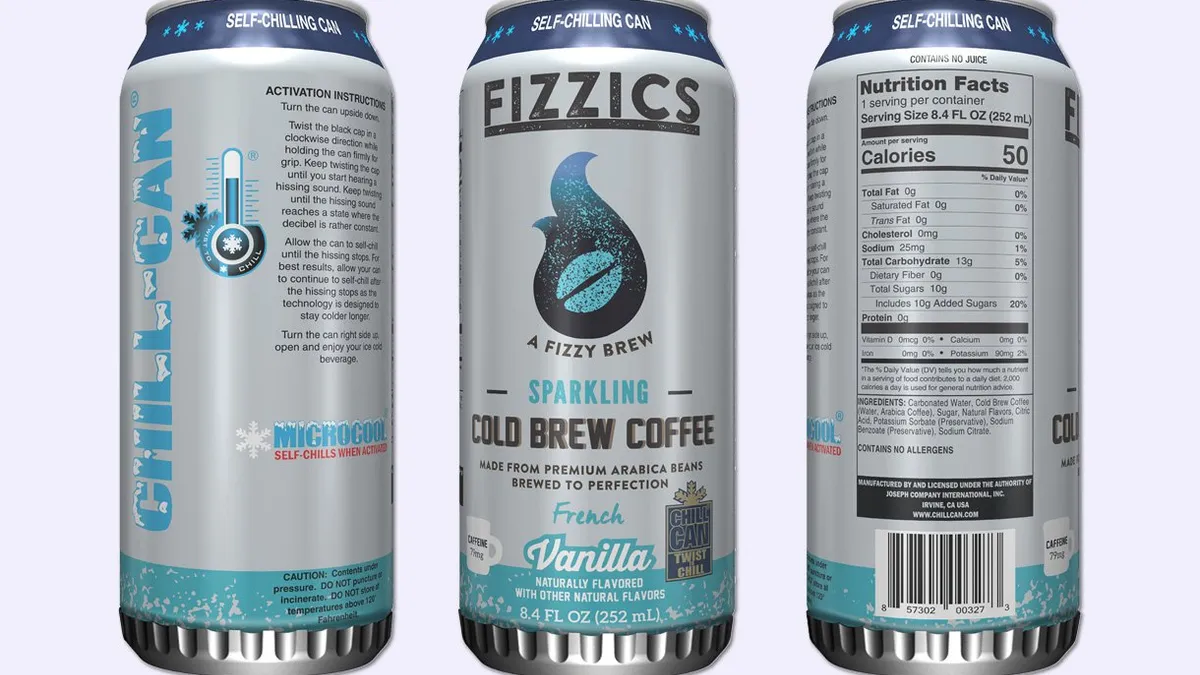Dive Brief:
- A new private label line of fizzy cold brew coffees packed in innovative self-chilling cans will be sold at 15 7-Eleven stores in the Los Angeles area for a trial run, reports FoodBev Media.
- The 8.4-ounce Fizzics Sparkling Cold Brew Coffee begins to cool down when consumers turn the can upside down and twist the base until a hissing sound is heard. The brew should be cold in 75 to 90 seconds. The space-age cans, which were under development for 25 years by the Joseph Company International, are recyclable, but add to the drink's price.
- The drink, which comes in regular, French vanilla and caramel, and all are made with 100% Arabica beans and natural flavors. “Fizzics will be the first that can be chilled on demand,” Tim Cogil, 7-Eleven's director of private brands,said to FoodBev. “This brings a new level of convenience to customers who want to enjoy a chilled drink whenever and wherever they are.”
Dive Insight:
These self-chilling cans may be a well-timed combo for today's consumer demands, as people crave convenience and speedy satisfaction, as well as chilled coffee. Statista reports sales of cold brew coffee are on the upswing, with a jump from about $8.5 million in 2015 to $38 million in 2017.
Fizzics joins other canned coffees launched in recent years, most notably Stumptown’s nitro cold coffee brew, available in some cafes and select retailers. The self-chilling technology also makes Fizzics as an innovative drink.
Packaging Digest notes that this is not the first time the Joseph Co. launched a self-chilling beverage can. In 2012, the company worked with Pepsi on a self-chilling model that eventually was pulled due to concerns the coolant used was bad for the environment. Company officials say they took years to carefully develop a new can without those issues.
As for the price, Mitchell Joseph, chairman and CEO of the Joseph Company, told Packaging Digest that the cost depends on volume sold. In the article, magazine editors say the new technology added about $1.50 to cost of a can of the drink West Coast Chill, and that Joseph told them consumers were eager to buy a drink that turned ice-cold on demand regardless of cost.
Whether that enthusiasm and willingness to pay a premium price will carry over to 7-Eleven customers, who may be more cost-conscious than other drinkers of specialty coffees, is yet to be seen. The company doesn't appear to be done experimenting.
Entrepreneur magazine reported that in recent years, 7-Eleven's innovation is expanding beyond selling drinks and snacks. The company has moved into a diverse number of enterprises, including a delivery partnership with Postmates, creating a system to allow customers to pay utility bills at certain stores, and working with Amazon to develop a program that would allow customers to turn cash into credit for purchases on the e-commerce giant’s website. Like other grocery and staples retailers, the convenience store is looking to other ways to make money at a time when competition is steep and margins are thin.








